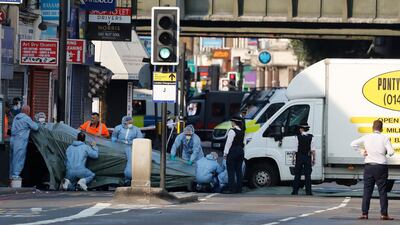The campaign to cut off funds to extremist groups has failed to keep pace with changing tactics employed by terrorists, a new report says Monday.
Counter-terror tactics remain embedded in the era of struggle against Al Qaeda after the September 11, 2001 attacks on the United States and has failed to adequately address the rise in lone-wolf attacks, according to the report by the Royal United Services Institute (Rusi), a London-based think tank.
Since 2001, terrorist groups have tapped into the technological advances of crowd-funding, social media and encrypted messaging systems to industrialise their fund-raising efforts to launch attacks.
"The global response to terrorist financing remains one-dimensional, despite the multi-faceted risk picture," according to the Rusi report, A Sharper Image: Advancing a risk-based response to terrorist financing.
“It is time to develop a more nuanced and risk-specific response to terrorist financing that is not merely rooted in the post-9/11 response to Al Qaeda.”
US President George W. Bush announced a programme to tackle the financial framework of extremist groups in the immediate aftermath of the 2001 attacks that was designed to “starve the terrorists of funding”.
The programme was aimed at a hierarchical guerrilla-style organisation without control of its own territory. Al Qaeda spent up to $500,000 to finance the September 11 attacks, much of which passed undetected through the formal financial system.
But financial policies have failed to change sufficiently with the emergence of ISIS, which earned up to $2 billion a year from the swathes of land it controlled in Iraq and Syria and groups such as Hezbollah who operate lucrative international business operations. Counter-terror funding operations have also failed to keep pace with the rise of radicalised individuals, according to Rusi.
Low-cost attacks in the UK in 2017 using cars and vans to mow down pedestrians and then stab passers-by have highlighted the impracticality of tracking suspicious currency flows to try to expose attack planning.
Instead countries should do more to identify and engage with van hire companies and chemicals retailers who might give early warnings of suspicious individuals, it said.
The report’s authors said that countries should refocus efforts to put greater emphasis on the intelligence value of financial flows. They cited the rise of right-wing extremists who used ticket sales for music concerts to fund their activities.
The global terror network cited by George W. Bush has “has turned out to be a patchwork of multiple networks of various actors – including emerging or resurging threats such as the extreme right wing – and diverse funding methods,” the report said.
The report also calls on social media companies to do more to prevent terrorists from exploiting their platforms to raise funds.
Rusi has previously identified networking sites such as Facebook, crowdfunding services such as GoFundMe and encrypted communication systems such as WhatsApp as potential aids to terrorists.
It said social media companies had to ensure that their terms of service explicitly ban terrorist financing and the companies should ban anyone promoting calls to do so.
“Globalisation, new technologies and new payment systems are vulnerable to terror funding as much as they are to exploitation by serious and organised crime groups,” it said.
The think tank has previously reported that “shaking an ‘electronic tin’ to solicit donations is considerably more effective than fundraising on street corners or in places of worship”.
Facebook, which owns WhatsApp, has said that it is committed to removing terrorist abuse of its platforms and removed 18 million examples of “terrorist content” in the first nine months of 2019, according to a senior official.


